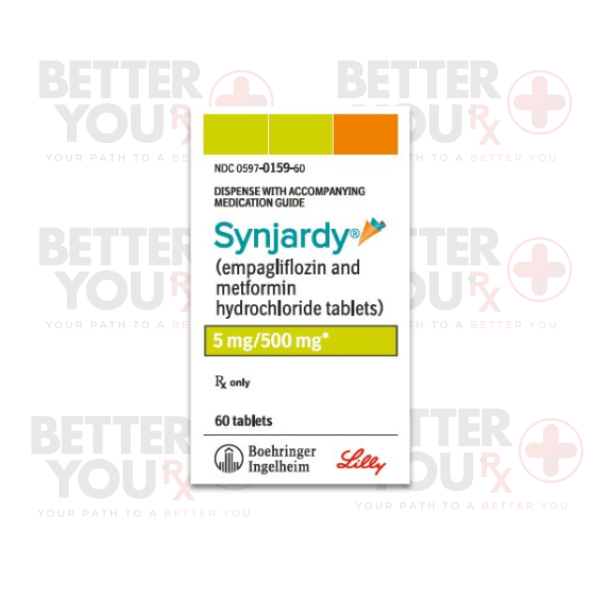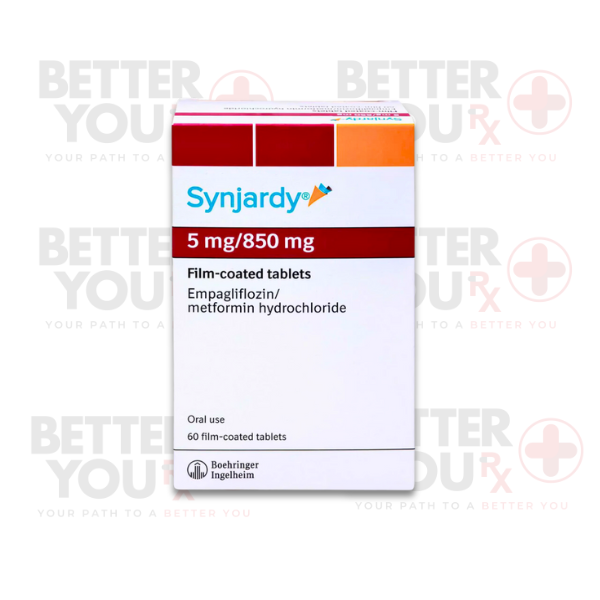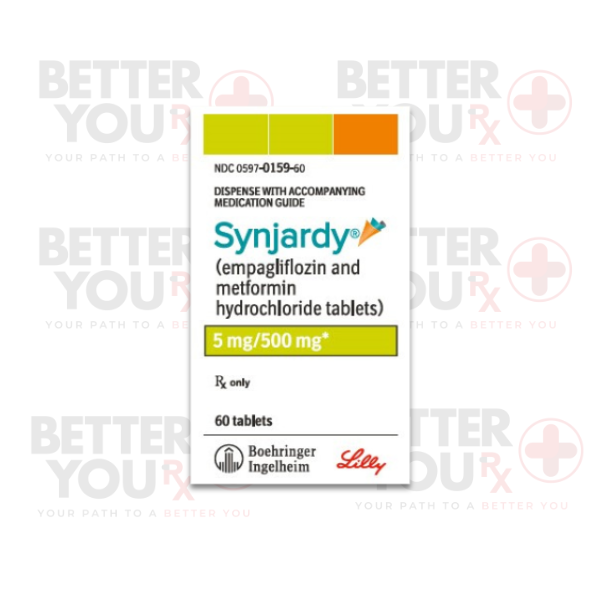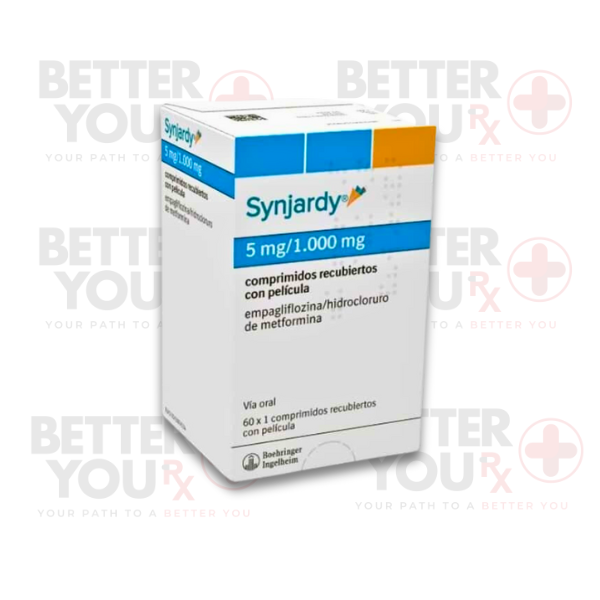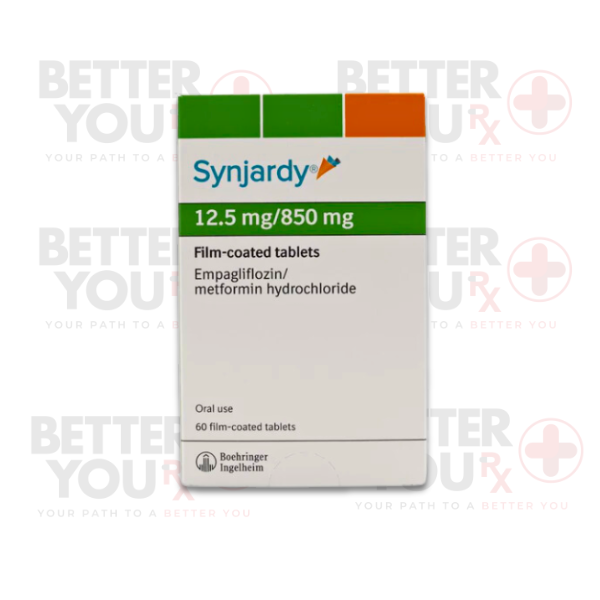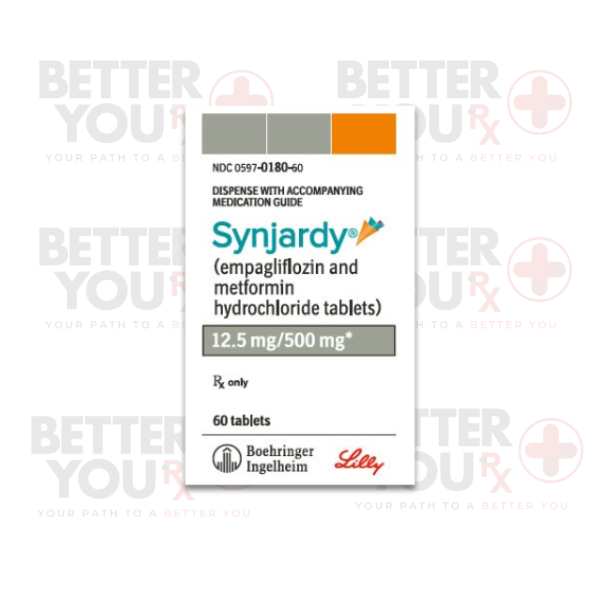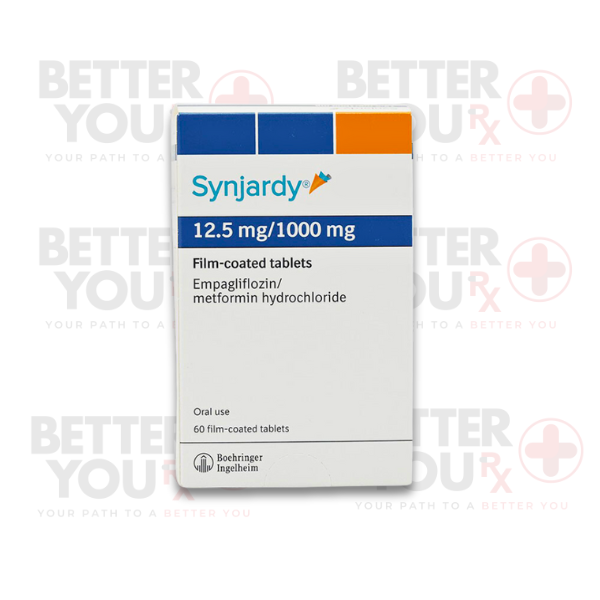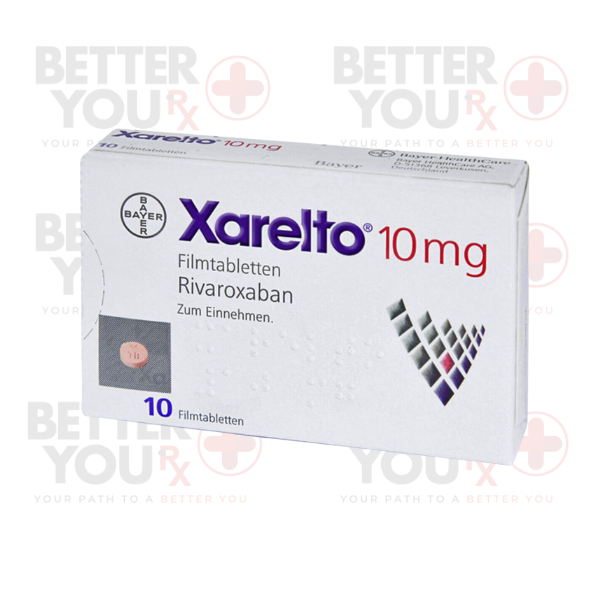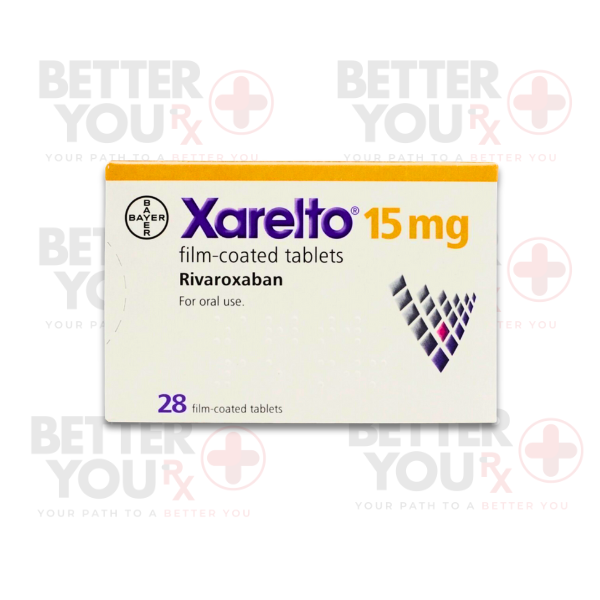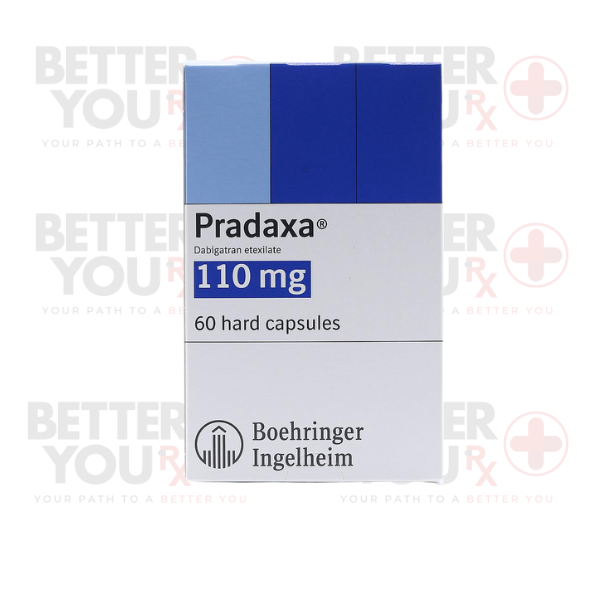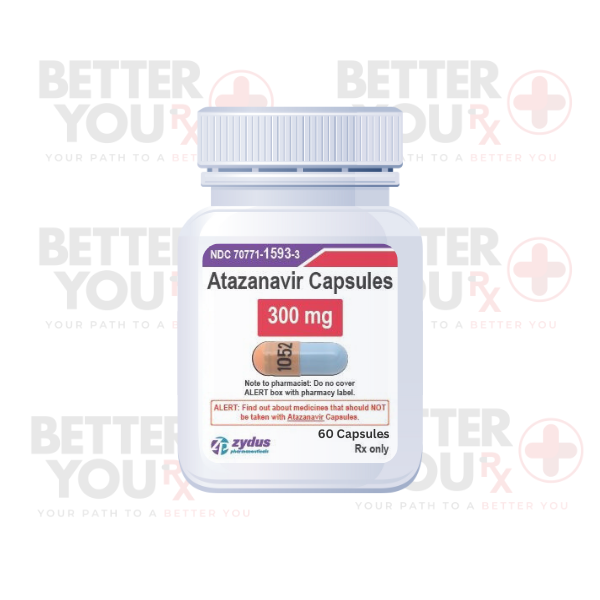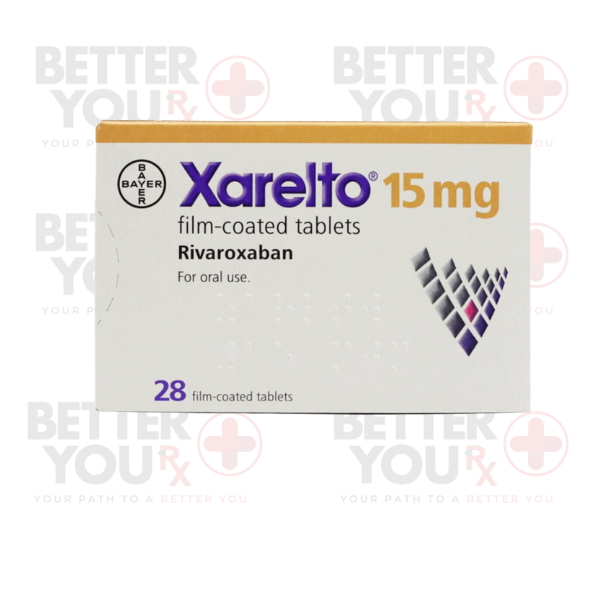Description
Synjardy is a prescription medication used to treat type 2 diabetes. It is a combination of two active ingredients, empagliflozin and metformin, that work together to lower blood sugar levels. Empagliflozin is an SGLT2 inhibitor that helps the kidneys remove excess glucose from the body, while metformin works by reducing the amount of glucose produced by the liver and improving the body’s sensitivity to insulin. Synjardy is typically prescribed when diet and exercise alone have not been sufficient to manage blood sugar levels.
Uses of Synjardy
Synjardy is used in the management of type 2 diabetes. Specifically, it helps:
- Lower Blood Sugar: By combining two medications that target different pathways, Synjardy is effective in lowering blood glucose levels in individuals with type 2 diabetes.
- Improve Glycemic Control: When combined with a proper diet and exercise, Synjardy helps to maintain blood glucose control throughout the day, reducing the risk of complications associated with diabetes.
Benefits of Synjardy
- Dual Action: The combination of empagliflozin and metformin provides a powerful, dual approach to controlling blood sugar. While metformin decreases the liver’s production of glucose, empagliflozin increases the excretion of glucose through urine, helping to manage blood sugar effectively.
- Helps with Weight Loss: Some users of Synjardy may experience modest weight loss, especially with the inclusion of empagliflozin, which can help with blood sugar management.
- Lower Risk of Cardiovascular Events: Empagliflozin has been shown to reduce the risk of heart-related complications in people with type 2 diabetes, making it an ideal choice for patients with diabetes and cardiovascular disease.
- Convenience: By combining two effective medications into one tablet, Synjardy simplifies treatment for individuals who need both drugs, making it easier to manage diabetes with fewer pills.
How Synjardy Works
Synjardy works by combining two mechanisms to control blood sugar levels:
- Empagliflozin: Empagliflozin is an SGLT2 inhibitor that works by blocking the reabsorption of glucose in the kidneys, allowing excess glucose to be excreted through urine. This reduces the amount of glucose in the bloodstream.
- Metformin: Metformin works by reducing the production of glucose in the liver and improving the body’s sensitivity to insulin, allowing the body to use glucose more effectively.
Side Effects of Synjardy
As with all medications, Synjardy may cause side effects, though not everyone will experience them. Some common side effects include:
- Gastrointestinal Issues: Nausea, vomiting, diarrhea, or stomach upset are common when starting metformin. These usually improve over time.
- Frequent Urination: Since empagliflozin increases the excretion of glucose, you may experience frequent urination or increased thirst.
- Low Blood Pressure: Due to the fluid loss associated with empagliflozin, some people may experience a drop in blood pressure, which can lead to dizziness or fainting, especially when standing up quickly.
- Kidney Problems: Both empagliflozin and metformin can affect kidney function. Your healthcare provider may monitor kidney function regularly to ensure the medication is working effectively and safely.
- Risk of Genital Infections: Empagliflozin may increase the risk of genital yeast infections, urinary tract infections, and other infections related to increased glucose in the urine.
Serious Side Effects
- Lactic Acidosis: A rare but serious side effect of metformin is lactic acidosis, which can be life-threatening. Symptoms include unusual tiredness, muscle pain, difficulty breathing, and dizziness. Seek immediate medical help if you experience these symptoms.
- Dehydration: Due to increased urination, Synjardy can cause dehydration. Make sure to drink plenty of fluids while taking this medication.
- Kidney Damage: Empagliflozin can cause kidney-related issues, so it’s important to have regular kidney function tests while on Synjardy.
- Severe Allergic Reactions: Signs of a serious allergic reaction include rash, itching, or difficulty breathing. If these occur, seek medical attention immediately.
How to Use Synjardy
Synjardy is typically taken as one tablet daily, with or without food. Your doctor will prescribe the appropriate dose based on your specific needs. Follow these steps for proper use:
- Take as Prescribed: Take the medication exactly as prescribed by your healthcare provider, and do not skip doses.
- Ingestion Instructions: Swallow the tablet whole. Do not crush, break, or chew the tablet.
- Monitor Your Blood Sugar: Regularly check your blood glucose levels as instructed by your doctor to track how well the medication is working.
- Avoid Alcohol: Limit alcohol intake while taking Synjardy, as alcohol can increase the risk of low blood sugar (hypoglycemia) and other side effects.
- Missed Dose: If you miss a dose, take it as soon as you remember unless it’s almost time for your next dose. Do not take two doses to make up for a missed dose.
Safety Advice and Precautions
Before starting Synjardy, inform your doctor about any pre-existing conditions, especially if you:
- Have Kidney Problems: Both empagliflozin and metformin affect kidney function, so it’s essential to monitor kidney health during treatment.
- Have Heart or Blood Pressure Issues: Synjardy can lower blood pressure, so inform your doctor if you have heart disease or low blood pressure.
- Are Pregnant or Breastfeeding: Synjardy is not recommended during pregnancy or while breastfeeding unless clearly needed. Consult with your healthcare provider for alternatives.
- Have Liver Disease: Liver function should be evaluated before starting Synjardy, as it may affect the way the body processes the medication.
- Have a History of Pancreatitis: If you have a history of pancreatitis (inflammation of the pancreas), discuss this with your doctor as empagliflozin may increase the risk of this condition.
What If You Forget a Dose of Synjardy?
If you miss a dose, take it as soon as you remember, but if it’s almost time for your next dose, skip the missed dose. Do not double the dose to make up for a missed one.
Overdosing
An overdose of Synjardy can result in serious side effects like lactic acidosis, dehydration, and low blood pressure. Symptoms may include dizziness, weakness, and trouble breathing. Seek immediate medical attention if you suspect an overdose.
How to Store Synjardy
Store Synjardy at room temperature, away from moisture and heat. Keep the medication in its original packaging and out of the reach of children. Do not use the medication past its expiration date.
FAQs About Synjardy
Q. How does Synjardy help control blood sugar?
Synjardy works by combining empagliflozin, which helps the kidneys remove excess glucose through urine, and metformin, which reduces glucose production in the liver. Together, they help control blood sugar levels in type 2 diabetes.
- Can Synjardy be used to treat type 1 diabetes?
No, Synjardy is not recommended for the treatment of type 1 diabetes. It is specifically indicated for type 2 diabetes. - Can I take Synjardy with other diabetes medications?
In some cases, Synjardy can be used alongside other diabetes medications. However, always consult your doctor before combining treatments to avoid potential interactions or side effects. - What are the benefits of using Synjardy for type 2 diabetes?
Synjardy provides dual benefits—helping lower blood glucose levels and offering cardiovascular protection, particularly for people with diabetes who also have heart-related conditions. It also simplifies treatment by combining two medications into one pill.
Buy Synjardy through Better You Rx
Better You Rx offers Synjardy through trusted Canadian Pharmacy Affiliate partners. Order today to manage your type 2 diabetes more effectively and enjoy improved glycemic control.
Disclaimer
This page is for informational purposes only and should not be considered as medical advice. Always consult your healthcare provider before beginning any new treatment, including Synjardy. Individual results may vary, and this medication may not be suitable for everyone. Please follow your doctor’s guidance for optimal treatment.

